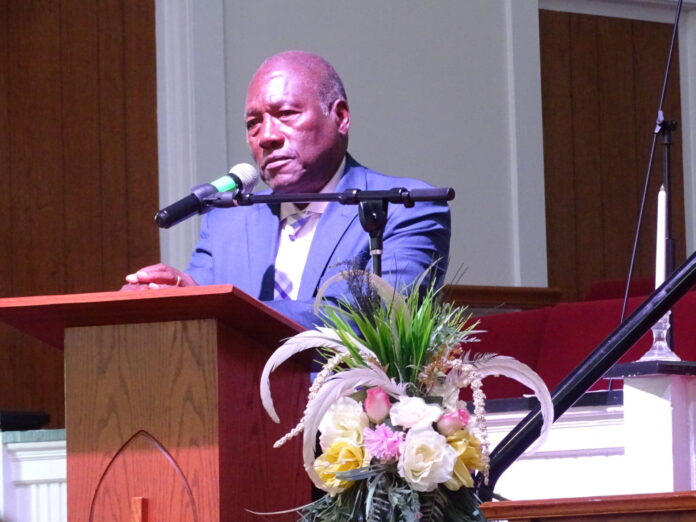
It was a dark and stormy night Aug. 19, when a motley group of history buffs and other area residents gathered in the cavernous historic sanctuary of Greater Union First Baptist Church of DeLand.
As lightning flashed and thunder rumbled through the pews, a former DeLandite — and current professor emeritus in the department of psychology at Florida International University in Miami — talked about his life growing up in DeLand in the 1940s and ’50s.
“My father didn’t like white people,” Dr. Marvin Dunn said.
Later, Dunn found out why. One night, his father, James Dunn, a second-generation DeLandite and grove-picker, had been walking from Glenwood home to DeLand with his fiancee, who would become Marvin Dunn’s mother.
The couple were walking down Grand Avenue when a truck passed them, then made a quick U-turn and sped at them. James Dunn shoved his fiancee into a ditch. They were in their good clothes.
“That embittered him, that insult to his being,” Marvin Dunn told the enraptured DeLand crowd.
For the next hour or so, Dunn led the audience through his life in the segregated South. It was a life that would find him falling asleep during a speech by the Rev. Martin Luther King Jr. at the prestigious Morehouse College in Atlanta, and serving in the U.S. Navy and standing on the bridge of the USS Kitty Hawk during a visit by President John F. Kennedy.
Dunn went on to become an esteemed psychology professor at Florida International University, and director of an alternative high school he co-founded after the 1980 race riots in Miami.
As a student at Euclid High School in DeLand, he recalled, he would go with his teachers and other students to pick up used books and laboratory supplies from DeLand High School, the white school.
“The perverted thing was, we were glad to get it,” Dunn said.
For most of his childhood, Dunn explained, the unequal treatment of races was “the way it was.” One incident stood out.
“Black people couldn’t open bank accounts, so you had to keep your money in the post office,” Dunn said.
As a young boy, he watched his grandmother be skipped in line as white customers passed ahead of her, and he thought that was wrong.
“My grandmother loved coffee,” Dunn said. “But she said it made you more black. So I didn’t drink coffee until I was 25.”
The only time, Dunn said, that there was no difference in the communities was the annual Downtown DeLand Christmas parade.

BROTHERS AND THEIR BOOKS — Dr. Ray Dunn, standing, helps his brother Dr. Marvin Dunn with a display of books at the West Volusia Historical Society’s Aug. 19 event at Greater Union First Baptist Church of DeLand. Marvin Dunn spoke about his childhood in DeLand. Ray Dunn writes children’s books, and made some titles available at the event
“Everyone sat wherever they could sit, it made no difference,” Dunn said. “Except, Santa was always white.”
On his way to Morehouse College, which he attended at the urging of former Euclid High teacher Fred Hinson, Dunn moved from the back of the Greyhound bus to the middle.
“Why did it feel so much better to be in the middle of the same bus, going to the same place?” Dunn asked.
But on the way up to Atlanta, a group of white kids also got on the bus, and a white girl sat next to him.
“I’d never been that close to a white person before, and you could hear a pin drop,” Dunn said.
A commotion began, but one white U.S. Marine corporal got up and told the crowd to leave Dunn alone, as he wasn’t bothering anyone.
“Well, they forgot about me right away,” Dunn said, turning their rancor on the Marine, instead.
“They said to him, ‘Oh, you must be a Jew, you must be from up North, you don’t know how we are around here,’” Dunn recalled.
The bus driver kicked Dunn off the bus, and he had to wait for the next one, scheduled for three hours later. This time, Dunn stayed in the back of the bus.
During his time at Morehouse, Dunn attended speeches given by the Rev. Dr. King (“I don’t remember a single word he said”) and early inflammatory speeches by Malcolm X, before the civil rights activist’s views had evolved (“Malcolm said white people had a prehensile tail at the bottom of their spine, because they were descended from monkeys in the trees, but black people didn’t. I thought to myself … What on earth is he talking about?”).
After graduating from Morehouse, Dunn joined the Navy, as his father had. In his father’s time, Black men were allowed to be only stewards or cooks, and when his father had returned from the service, he was told not to wear his uniform in Downtown DeLand. Instead, Dunn said, his father bought five sailor suits for him and his brothers, all little boys at the time.
By Marvin Dunn’s time, in the 1960s, there were different hurdles: He failed his first officer test, he said, because while white recruits stayed at a hotel in Jacksonville, he was sent to spend the night at a house of prostitution across the tracks, where he didn’t sleep and certainly didn’t eat any of the food.
After filing a complaint, Dunn got his opportunity to take the test again, and passed.